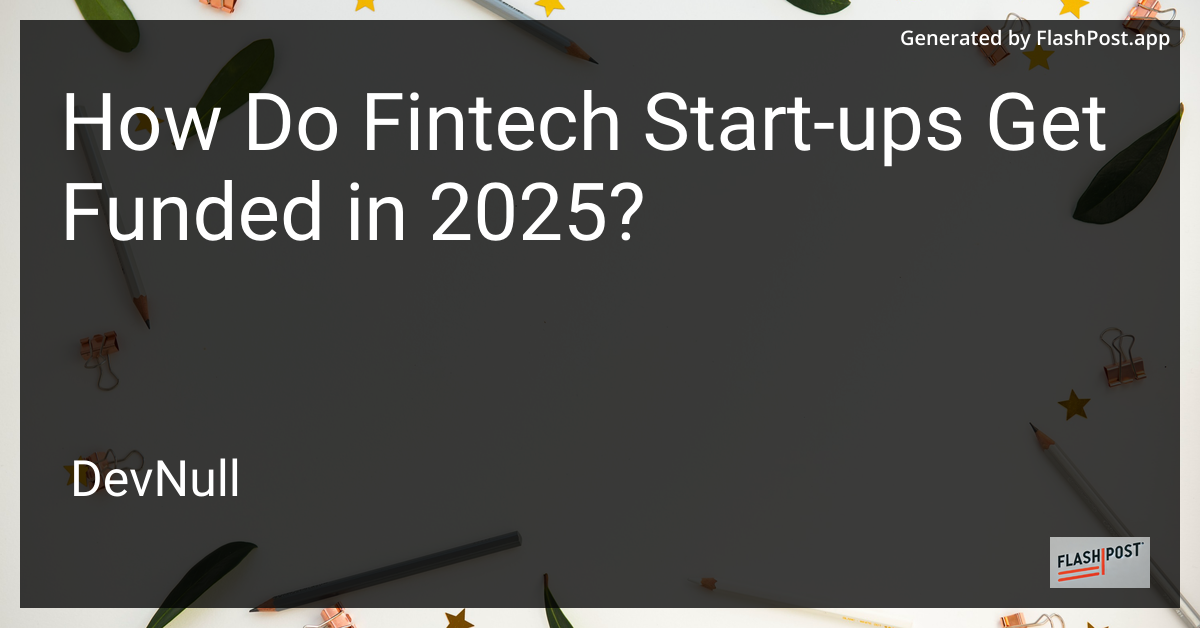

How Do Fintech Start-ups Get Funded in 2025?
In the rapidly evolving financial landscape of 2025, fintech start-ups are at the forefront of innovation, offering solutions that cater to a technologically savvy and financially conscious market. However, securing funding remains a critical challenge for these start-ups striving to turn compelling ideas into successful ventures. This article delves into the ways fintech start-ups can get funded in 2025, providing valuable insights and strategies to navigate this competitive field.
1. Venture Capital and Angel Investors
Venture Capital (VC): In 2025, venture capital remains a crucial pillar for fintech start-up funding. VCs, often with specialized fintech portfolios, seek innovative solutions with significant growth potential. Start-ups should focus on a strong value proposition, a scalable business model, and a robust financial plan to attract VC attention.
Angel Investors: Alongside VCs, angel investors continue to be pivotal. They typically offer seed funding and valuable mentorship. Engaging with angel networks and pitching through platforms can provide exposure to potential investors interested in fintech innovation.
2. Crowdfunding Platforms
Crowdfunding has become highly sophisticated by 2025, with platforms specifically designed for fintech projects. These platforms not only offer funding opportunities but also validate a start-up’s concept through public interest and demand. Fintech entrepreneurs can leverage equity crowdfunding to raise capital while maintaining control over their ventures.
3. Strategic Corporate Partnerships
Many established financial institutions are eager to collaborate with fintech start-ups to enhance their technological capabilities. Strategic partnerships can provide essential funding, expertise, and market access. In 2025, these collaborations often result from successful participation in corporate accelerators and innovation contests.
4. Government Grants and Incentives
Governments worldwide, recognizing the economic benefits of supporting fintech innovation, offer various grants and incentives. These programs are often sector-specific, geared towards fostering technological advancements and financial inclusion. Entrepreneurs should remain informed about available opportunities and align their projects with government priorities to maximize their chances of obtaining funding.
5. Initial Coin Offerings (ICOs) and Security Token Offerings (STOs)
While traditional ICOs faced regulatory scrutiny, 2025 sees a matured landscape with Security Token Offerings (STOs) providing a compliant and transparent alternative. Fintech start-ups leverage blockchain technology to issue security tokens, enabling a wider investor base and democratized financing options.
Conclusion
Securing funding in 2025’s fintech sector requires a strategic approach, combining traditional methods with innovative avenues. Success depends on a start-up’s ability to clearly communicate its unique value proposition, showcase robust financial planning, and leverage emerging technologies responsibly. By staying informed about industry trends and funding mechanisms, fintech entrepreneurs can navigate the complexities of securing the necessary capital to drive their growth and innovation.
For those interested in diversifying their skill set, consider exploring how to install Minecraft mods. While not directly related to fintech, the creativity and technical expertise gained from such endeavors can enrich the innovative spirit crucial for fintech success.
